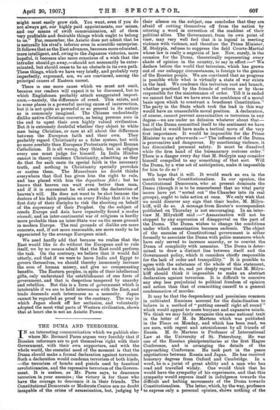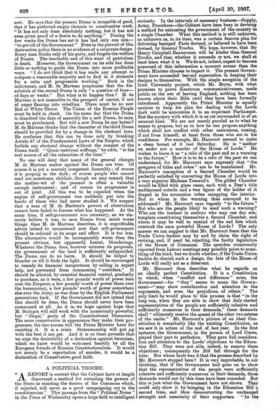THE PUMA AND TERRORISM.
TN an interesting communication which we publish else- 1 where Mr. Bernard Pares argues very forcibly that if Russian reformers are to put themselves right with their Government, with their own supporters, and with the whole world, the essential need of the moment is that the Dun* should make a formal declaration against terrorism. Such a declaration would condemn terrorism of both kinds, —the terrorism of bombs and pistols used by fanatical revolutionaries, and the repressive terrorism of the Govern- ment. It is useless, as Mr. Pares says, to denounce terrorism in your enemies ; the victory is for those who have the courage to denounce it in their friends. The Constitutional Democrats or Moderate Centre are no doubt *capable of the crime of assassination, but, judging by their silence on the subject, one concludes that they are afraid of cutting themselves off from the nation by uttering a word in correction of the maddest of their political allies. The Government, from its own point of view, may very well feel that it is logical in meeting violence with violence, and therefore the Prime Minister, M. Stolypin, refuses to suppress the field Courts-Martial whose law is really a negation of law. Now, surely, is the occasion for the Duma, theoretically representing every shade of opinion in the country, to say in effect :—" We declare before the world that terrorism, which has grown out of our unhappy circumstances, is foreign to the genius of the Russian people. We are convinced that no progress is possible while what is virtually a state of war exists in the land. We condemn this terrorism root and branch, whether practised by the friends of reform or by those responsible for the maintenance of order. Till it is ended we cannot feel that we have even the semblance of a moral basis upon which to construct a beneficent Constitution." The party in the State which took the lead in this way would have an unassailable moral position. A declaration, of course, cannot prevent assassination or terrorism in any degree—we are under no delusion whatever about that— but if the Duma committed itself to the sentiment we have described it would have made a tactical move of the very first importance. It would be impossible for the Prime Minister to say afterwards :—" The influence of the Puma is provocative and dangerous. By sanctioning violence, it has diminished personal safety, It must be dissolved while the firm hand of the bureaucracy restores order.'! There is a danger every day that M. Stolypin may consider himself compelled to say something of that sort. Will the Duma, by a wise act of anticipation, make it impossible for him to do so ?
We hope that it will. It would mark an era in the march towards Constitutionalism. In our opinion, the Constitutional Democrats, who at present dominate the Dania (though it is to be remembered that no vital party issues have yet "sorted out" the Chamber into its real. groups), ought to take action at once. We only wish that we could discover any sign that their leader, M. Milyu- Ulf, will do so. A message from Reuter's correspondent published on Thursday is not encouraging. In an inter- view M. Milyuk6ff said :—" Assassination will not be stopped by any expression of disapproval on the part of the Puma. The Puma wishes to change the conditions under which assassination becomes endemic. The object of the enemies of Constitutional government is either formally to associate the Duma with police measures which have only served to increase anarchy, or to convict the Puma of complicity with assassins. The Duma is deter- mined to draw a distinct line between itself and the Government policy, which it considers chiefly responsible for the lack of order and tranquillity." It is possible to agree with the substance of the whole of this statement, which indeed we do, and yet deeply regret that M. Milyu- k6ff should think it impossible to make an abstract declaration against terrorism. It is difficult to conceive any step less prejudicial to political freedom of opinion and action than that of committing oneself to a general condemnation of murder.
It may be that the despondency and pessimism common in cultivated Russians account for the disinclination to believe in a method of "putting oneself right all round" which would appeal to more buoyant and expansive minds.. We think we may fairly recognise this same national trait in the letter of M. de Martens which was published in the TisteR on Monday, and which has been read, we are sure, with regret and astonishment by all friends of Russia. M. de Martens is Professor of International' Law at the University of St. Petersburg. He was one of the Russian plenipotentiaries at the first Hague Conference, and is arranging the details of the approaching Conference. He took part in the peace negotiations between Russia and Japan. He has received honorary degrees from Oxford and Cambridge. In a word, he is a jurist of great ability and a man who has read and travelled widely. One would think that he would have the sympathy of his experiences, and that this sympathy would express itself in indulgence towards the difficult and halting movements of the Duras towards Constitutionalism. The letter, which, by the way, professes to express only a personal opinion, shows nothing of the
sort. He says that the present Duma is incapable of good, that it has preferred empty rhetoric to constructive work. "It has not only done absolutely nothing, but it has not even given proof of a desire to do anything." During the few weeks the Duma has sat it has had only one aim— "to get rid of the Government." Even in the pursuit of this destructive policy there is no evidence of a corporate design. Every man thinks only of his party, and forgets the welfare of Russia. The inevitable end of this want of patriotism is death. Moreover, the Government on its side has done little or nothing to guide the Duma into more profitable ways. "I do not think that it has made any attempt to compose a reasonable majority and to find in it elements for a calm and progressive working." Such is the indictment, and M. de Martens prophesies that the dis- solution of the second Duma is only "a question of time— of days or weeks." But what is to happen then ? M. de Martens is not insensible to the prospect of unrest, if not of anger flaming into rebellion. There must be no new Red or White Terror. The Union of the Russian People must be held in check. On the same day that the Duma is dissolved the date of assembly for a new Duma, he says, must be proclaimed. But will a new Puma be any better? M. de Martens thinks that the character of the third Duma should be provided for by a change in the electoral laws. He confesses that this can be done only by breaking Article 87 of the Fundamental Laws of the Empire, which forbids any electoral change without the consent of the Duma itself. "Quasi-universal suffrage," he adds, "is the real source of all the calamities of the time."
No one will deny that many of the general charges M. de Martens makes against the Duma are true. Of course it is yet a scarcely competent Assembly ; of course it is groping in the dark ; of course people who cannot read are sometimes childish, though we may remark that the mother-wit of the peasant is often a valuable enough instrument; and of course its programme is out of joint. All this was to be expected when the engine of self-government was suddenly put into the hands of those who had never studied it. We suspect that a man of M. de Martens's powers of observation cannot have failed to foresee what has happened. At the same time, if self-government was necessary, as we sin- cerely believe it was, to save Russia from much worse things than M. de Martens describes, it is unprofitable advice indeed to recommend now that self-government should be reduced in its scope and effect. It is too late. The alternative would be incomparably worse than the present obvious, but apparently honest, blunderings. Whatever the Puma does, however extreme its proposals, the government of the land is sufficiently safeguarded. The Puma can do no harm. It should be helped to blunder on till it finds the light. It should be encouraged to remedy its financial inexpertness by calling in expert help, not prevented from summoning "outsiders." It should be allowed, by essential financial control, gradually to purchase, as it were, a few pounds' worth of power here over the Emperor, a few pounds' worth of power there over the bureaucracy, a few pounds' worth of power somewhere else over the Army, as was done by the English Parliament generations back. If the Government did not intend that this should be done, the Duma should never have been summoned at all. As it is, we hope against hope that M. Stolypin will still work with the numerically powerful, but "illegal," party of the Constitutional Democrats. The more conservative in appearance they make their pro- gramme, the less excuse will the Prime Minister have for resisting it. It is a crisis. Statesmanship will put .up with the best it can get. And it is on these grounds that we urge the desirability of a declaration against terrorism, which we know would be welcomed heartily by all the European friends of Russian Constitutionalism. It would not merely be a reprobation of murder, it would be a declaration of Conservative good faith.











































 Previous page
Previous page